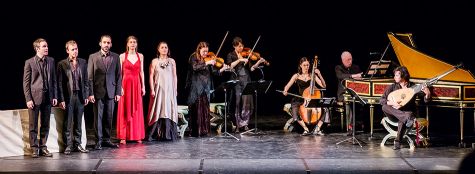|
Chamber
FAMILIAR AND NEW - TRIO NAVARRO'S SPRING CONCERT IN WEILL
by Terry McNeill
Sunday, April 21, 2024
Symphony
MONUMENTAL MAHLER 5TH IN SO CO PHIL'S SEASON ENDING CONCERT
by Terry McNeill
Sunday, April 14, 2024
Chamber
OAKMONT SEASON CLOSES WITH STRAUSS' PASSIONATE SONATA
by Terry McNeill
Thursday, April 11, 2024
Chamber
MORE GOLD THAN KORN AT ALEXANDER SQ CONCERT
by Terry McNeill
Sunday, April 7, 2024
Choral and Vocal
VIBRANT GOOD FRIDAY REQUIEM AT CHURCH OF THE ROSES
by Pamela Hicks Gailey
Friday, March 29, 2024
TWO OLD, TWO NEW AT THE SR SYMPHONY'S MARCH CONCERT IN WEILL
by Peter Lert
Saturday, March 23, 2024
Chamber
NOT A SEVENTH BUT A FIRST AT SPRING LAKE VILLAGE CONCERT
by Terry McNeill
Wednesday, March 20, 2024
THIRTY-THREE PLUS VARIATIONS AND AN OCEAN VIEW
by Terry McNeill
Saturday, March 16, 2024
Choral and Vocal
A ST. JOHN PASSION FOR THE AGES
by Abby Wasserman
Friday, March 8, 2024
Choral and Vocal
SPLENDID SCHUBERT SONGS IN SANET ALLEN RECITAL
by Terry McNeill
Saturday, March 2, 2024
|
 |
 Partial Les Artes Florissants touring troupe in 2015 |
RAVISHING SHORT OPERAS FROM FRENCH TROUPE IN WEILL
by Terry McNeill
Friday, November 10, 2017
Standard Weill Hall fall and winter classical programs are pretty routine – symphonic music, chamber, solo recitals – so it was a rare treat Nov. 10 when just two works from the 17th century were gloriously presented.
With such specialized compositions, period performers with commanding authenticity are needed, and with Purcell’s Dido and Aeneas and Charpentier’s Actéon the Les Artes Florissants ensemble from Caen, France, were an ideal match. Before an audience of 400 the seven singers and seven instrumentalists, guided at the harpsichord by founder and director William Christie, gave spirited and authoritative readings of the two lyric operas, composed within six years of each other in the 1680s.
Colorful women’s dresses helped brighten the bare Weill stage and each of the singers moved about the stage and emphasized parts of the dramas. Actéon is a pastorale en musique with an ideal balance between dramatic singing, instrumental ensemble (two violins, viola, gamba, baroque oboe, 12-string lute and harpsichord) and stage action. The movement of the singers and their theatrical facial expressions and shouts lent excitement and sometimes histrionic charm inside the bounds of the restricted performance area.
Charpentier’s libretto is brief: Actéon and his hunting pals separate, and the later finds himself viewing the goddess Diane and her sisters bathing in a bucolic pool with flowers. He hides but is discovered, and the avenging Diane casts a spell that turns Actéon into a stag. He flees but us torn apart by the hunter’s hounds.
Singing Diane was the regal Élodie Fonnard with Reinoud Van Mechelen as Actéon. Both were able to direct their powerful voices to mesh with, at least for Diane, the women giving advice that surrounded her in the forest. Mr. Van Mechelen was particularly persuasive in the complex scene where he turns from man to animal. The unnamed choreographer (Mr. Christie?) designed simple but quite effective gestures and movements that supported the luscious baroque harmonies and repetitive French opera rhythms. There was palpable sadness from Diane’s court over a vengeful and perhaps an unnecessary hero’s death, using rich vocal colors, but it was of minimal duration. A standing ovation followed the final words.
A concert oversight was that no musicians were identified in the printed program, nor were they on the French websites. Mention needs to be made of the gamba player who toiled tirelessly all evening with Mr. Christie in continuo, and the 12-string lutenist that sat in the harpsichord’s case curve and provided non-stop sonic underpinning.
After intermission the more popular and slightly longer Purcell work was heard with the same forces. The sprightly overture was exciting, highlighted by cello and lute duos, and the oboe part could mimic the sounds of subdued brass and a modern clarinet. Odd indeed to my ears. The longer recitatives were supported by the lute and harpsichord lines. In Dido the singing continued to adroitly bring character and shape to the minimal but telling words. Carlo Vistoli (countertenor) had the requisite calculating menace as the sorceress, and the two witches (Maud Gnidzaz and Virginie Thomas) had penetrating snarls, as did the multi-character Renato Dolcini (Aeneas, peripheral participant). Familiar arias such as “Come Away Ye Sailors” and “Ho Ho Ho When Ships Sail Away” were sung with attractive abandon.
A lovely gamba solo introduced the famous Dido’s Lament (When I am Laid In Earth) that was sung with carefully shaped descending whole notes by soprano Lea Desandre, who then slowly strode stage left through the door to her opera doom. Sadness was convincingly conveyed by the upper strings and finally by the chorus, asking that roses as soft ad Dido’s heart be spread on her tomb.
A first in Weill Hall was supertitles, displayed on a forty-foot wide black screen and hung over the choral section behind the stage. The letters, unlike in many local theaters, were large and easily readable, and were faultlessly coordinated with the two mesmerizing productions, the first in impeccable French and the second in mostly recognizable English.
|

